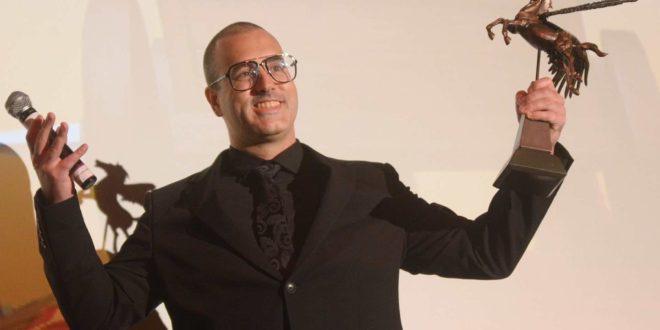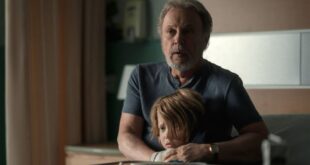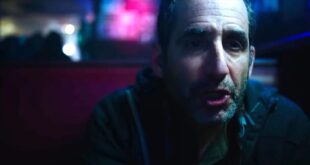I was truly fortunate to watch some truly incredible films for this year’s Fantasia International Film Festival. But the one that really stood out to me and instantly became one of my top three of the entire year was Rob Jabbaz’s The Sadness. It started as one of my most anticipated films, and then wow. That’s all I can say. Just wow. The gore, the dialogue, the utter vulgarity… I. Fucking. Loved. It. To celebrate the film’s North American premiere, I was lucky enough to have a long and very fun Zoom interview with Rob where we talked about everything from how the film came about, selecting the music, the practical effects, and more.
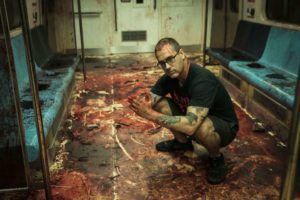
PopHorror: I watched The Sadness last night and let me just say… It is one of the best movies I have seen this year so far. It’s fantastic, and the amount of people that are jealous that I got to watch it… I am living for that right now.
Rob Jabbaz: Let me tell you. I am what you call a “golden goose.” I am the Raven Banner golden boy right now, and everyone’s just fawning over me. I’m kind of just joking right now. I really appreciate it. I’ll tell you that the film was released with zero fanfare in Taiwan. It was under-marketed and the marketing that was done for it lacked targeting. It just didn’t really understand the audience that it was going for. So it’s super nice to see people in the rest of the world be like, “Oh yeah, all that stuff that you tried to do? I got it.” I was like, “Oh God, thank God.” It’s an affirmation of just like, “Oh wow!” I actually can make a movie that people like because I was getting gaslit left, right and center with everyone in Taiwan just being like, “Yeah, well, you know, maybe filmmaking isn’t for everyone, Rob.”
PopHorror: Well, that leads to one of my questions. This is one of the most buzzed about films right now. It’s all over social media. People are posting it. I’m in a bunch of extreme horror groups on Facebook, and it’s just post after post of people who want to see this movie so badly. How does it feel to have your first feature be so sought after?
Rob Jabbaz: I guess I don’t really have any frame of reference. I just think that this is how it always is. To be honest, I’ve always thought that I could make a movie. I always thought that I could do a movie if I was given the opportunity, but I never aggressively pursued it. I just waited until I was 39-years-old for it to just fall into my lap… 38, actually. And then when it did, I just went, “Okay, let’s do it.”
The answer to the question is: it feels good. At the same time, after maybe the 10th day of shooting, seeing a couple scenes coming together, a couple of the dailies, how the music was coming together, and how all the practical effects—the onset effects—were working, I knew that it would work. And so then I was like, “Okay, we’re absolutely going to get Fantasia, Fantastic Fest, Sitges and all these genre festivals. What else is there? It’s COVID. What else is being made, you know? What’s my competition right now, anyway? So I just figured even by default, I’d have some attention. Because just the scale—the amount of locations, shooting outside and the scope of it and everything else—I just thought at the very least this will be in the festivals by default. But then we got invited to Locarno [Film Festival] and I was like, “Okay. This is actually a big deal.” The Locarno invitation was like, “Okay, we have something that’s more than just a straight-to-VOD. Just like a gore movie that they didn’t intend for it to be funny when they were making it but then they kind of were like ‘Uh-oh. We better pretend that we meant for this to be funny,” and then they release it that way.” You know the kind of movies I’m talking about.
PopHorror: Yeah, I do. So what inspired the film and how did this project come about
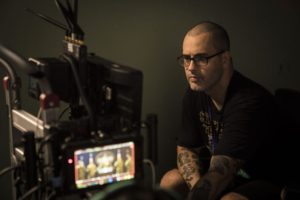
Rob Jabbaz: It was very pragmatic. I was a staff writer for this guy who used to be a pop star in Taiwan. He started this entertainment company. He’s almost 50 right now. He’s wealthy through crypto and internet stuff. He likes movies and was like, “I want to make a movie!” So I said, “Okay, do you have any ideas?” and he’s like, “Oh yeah. I have this idea about this, like a math equation or something, and it makes people crazy, and then there’s zombies.” I was like, “Okay, well… Let’s strip it all down. What exactly do you want to see from this movie in terms of just pure sensation?” He was like, “I want it to be people on people violence. I want it to take place in some sort of underground facility like in Resident Evil. And also I want it to be low budget. I want to be able to pay for it with a low budget.” So then I just went to work for literally almost a year trying to write this script and giving it to him. He’s looking at it like, ”No.” And trying to write other stuff. I have this other idea for another thing, and it just was going nowhere. It’s hard to drop a huge chunk of change on an independently financial film. If it’s not blowing your mind, right?
So then the guy says, “Okay, there’s a virus, like COVID. Hollywood’s shut down. Let’s make this movie right now!” I was like, “Okay, what are we doing? Are we doing the thing with the math or whatever?” And he’s like, “No, no. Something about a pandemic, zombies, violence. I don’t want there to be a lot of science fiction talking stuff. I just want it to be stuff happening, action, and whatever. So then I started thinking, “We don’t really have a lot of money, so what’s going to set us apart from every other zombie movie? Oh, I know. Like if we make it really vulgar and cruel, then those things are free, and we can leverage our visibility above the rest with that,” and that was basically it.
So I wrote the script in four weeks. If you were to just read the script… I had people in Taiwan reading the script, and they were saying, “Oh, so this is like a horror comedy like Zombieland or something?” And I was like, “No. I don’t intend it to be like that.” Out of context, if you look at a lot of the dialogue that the infected people are saying, maybe it could be construed as a comedy or something. It just became very clear that I could either let this script go that I written three and a half weeks go, and let some jerk-off direct it so they can run it into the ground, and I know it’ll suck. Or I can try to direct it myself. And sure enough, Jeff, the pop star guy, couldn’t find someone to direct it for the money within the budget. So then he was like, “Rob, do you want to do it?” And I was just like, “Okay. But you have to let me do it exactly the way I want to do it.”
I want it to be the most intense, crazy movie of the year, worldwide. I don’t want to cater towards the Taiwanese audience. I don’t want to hear a bunch of shit about like, “You know what? We should do it this way because Taiwanese people like it better this way,” or “You probably don’t understand this because you’re not from here, but actually, they would do it this way.” I don’t want to hear any of that. I want to do it exactly the way that I want to do it, and then also I want to get final cut. In the end, I ended up just cutting and editing it myself, because I didn’t like what the editor was doing. I thought the guy didn’t know how to get a scare happening properly. He was cutting too quick like he didn’t understand when to hang on to something and when to get out of it. It became clear that I had to edit it, too.
So that was basically it. That’s the process of the movie. It was just like, “If we’re going to do it, then now is the time to do it. Our bets are hedged right now. Taiwan dealt with the virus—the COVID-19 virus—really well right off the bat, so we were able to do it. That is really why it happened. It was like a perfect storm, you know?
PopHorror: The gore is fantastic, and the kills are really some of the best I’ve seen in a long time. That fire extinguisher scene was very Irreversible.
Rob Jabbaz: Well, yeah. It’s a fire extinguisher.
PopHorror: I read that you insisted on practical effects. Was there anything that you had to hold back on for any reason?
Rob Jabbaz: When you say any reason, do you mean someone telling me to not do something? There were some decisions I made because I thought something would be better artistically.
PopHorror: Did anybody, or even yourself, feel like something went too far or that you thought maybe wouldn’t work very well on camera, with budgetary restraints, or anything like that? Or maybe an actor saying, “No, I’m not going to do that”?
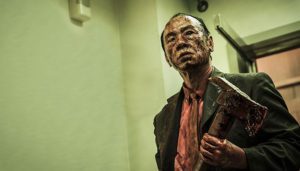
Rob Jabbaz: The actors were great. All of them were great. I think that the older ones like Tzu-Chiang Wang [Johnny] was like, “Hell yeah! I’ve been waiting to do this.” He was a positive presence on set, an older, more experienced actor, and he’s very avuncular. He’s the kind of guy who would give help and advice to the younger actors on the set and really act like a mentor. Not only did he believe in the movie, but he also was one of the few who understood it. I say this a lot whenever I give these interviews.
Cinematographer Jie-Li Bai, composer Tzechar, Johnny, and I were the four guys who actually had clarity on what the movie would be right from the get go. We all knew exactly what it was going to be and everybody else had no clue what the hell we were doing. “Oh, yeah. Real scary. It takes place all in the daytime.” That doesn’t really actually make sense. They were a great crew. The chatter on break was about the lack of understanding of what the final product would be, because obviously we’re doing something that was largely unprecedented in the history of Taiwanese film.
But let me answer your question. The thing about the gore… The actress, Chen Ying-Ru, who played the Molly character, was an extremely selfless actress. “Okay, I need you to do this.” She’s like, “No problem. I believe in you.” She really believed in me and the vision. I’m not sure that she totally understood because she’s not really a horror person. She’s younger and maybe didn’t really get what the film would be in the end, but she believed that I knew what I was doing, so when we did the eye rape scene with Johnny, I knew that if we showed that by making a prosthetic head or used some kind of VFX fake shenanigans with a fake penis or something like that, it wouldn’t be…
It’s not like somebody was trying to tell me not to do that. I knew that if we did that, the audience wouldn’t be that impressed with the movie. The violence wouldn’t hit properly. Instead, I decided to make it more about the little guy underneath the gurney hiding and trying to will it not to happen. There’s no point in the film where I wanted to go further. I think that it’s important to see where the line is and to not go over it, because in the end if you go over the line, it harms the film. The audience turns on you, not like, “This is offensive! You went too far, buddy!” but they roll their eyes and they go, “Oh wow, you’re so extreme.” They do that, right? That’s how people react, so I felt that in order to keep the audience on my side, I needed to handle it—especially the sexual violence—carefully in order to keep them, the cynicism, and the eye rolling at bay.
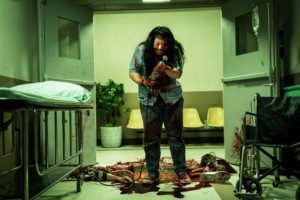
PopHorror: Yes, I agree with that. You mentioned the composer, Tzechar. The music really helped set the tone. How did you approach them, and how important was the soundscape to you?
Rob Jabbaz: I’ve always said that in a movie, the sound is like 51%. Originally, I was thinkin, “What were some soundtracks that I really like?” like the soundtrack from the remake of The Crazies. Also, I like the Hereditary soundtrack. Those were unusual instruments for a horror film. And then the soundtrack for Elijah Wood‘s Maniac. Those were the three, and I was like, “Are these enough references?” And then I tried to get in touch with people I knew personally who did music, not necessarily approaching a composer. Then I couldn’t find one, so I started going through SoundCloud, and I found Tzechar, who was famous—blog, electronic music famous—for like 2,012 remixes of K-pop songs. I was like, “This is pretty hype! Maybe these guys are the right guys to tackle this. They don’t have anything like this. They’ve never done anything like this, but maybe they’re right.” So then I just got in touch through SoundCloud, and I told them about the project. The guy was like, “We’ll give it a shot!” It was a total shot in the dark, and they could have have just jumped the ship in the 11th hour and been like, “Fuck this! We’re not doing this anymore.” I just trusted them, and I figured that they would know what they were doing. I was showing them changes in the script and being like, “What do you guys think of this?” They became a real creative contributor on the film.
PopHorror: That’s so awesome!
Rob Jabbaz: Yeah! I made a lifelong friend. I don’t think I’ll ever do a movie without at least giving Tzechar the first look. If they don’t want to do it, then I’ll find someone else. Same thing with my cinematographer, Jie-Li Bai. It was a really good creative relationship. I’d never met the guy before, but we just saw eye-to-eye, both appreciated what we’re doing.
PopHorror: What is up next for you? Is there anything else that you’re currently working on?

Rob Jabbaz: I’m writing stuff. It would be nice to just be a director, a Mr. Artistic, and work on movies without having to worry about all the marketing and stuff. In fact, when my studio didn’t know what to do with the film after the Taiwanese release, they ended up trying to dump it onto a number of platforms, and those platforms didn’t want it, mainly because of the combination of the level of violence and the lack of interest and fanfare. So, I’ve had to take on the role of the guy who’s doing promo for the film. A lot of my time is spent working with Raven Banner. We’re developing all this new promo material for the international release and going through this vetting process. We just finished all this stuff with the new trailer, the new poster, figuring out which festivals to apply to, which festivals to actually appear in person.
It’s not easy to travel right now, either. I moved from Taiwan to Canada for the next two months. I’m away from my cats and my girlfriend and everything, because I want to be able to move more freely and not have to quarantine for two weeks every time I go back to Taiwan. Long story short, I have some ideas, but I just haven’t been able to focus on them. To give you a quick thing, I’ve got an idea for something that’s like a monster movie. Have you seen the film I made called Clearwater?
PopHorror: I have not. Is it available to see?

Rob Jabbaz: It’s on Dust, the YouTube curator. I did a thing called Clearwater, sort of a science fiction monster thing. It’s very short, like six minutes long. I’ve found that that short film is just a sliver of this whole sort of mythology that I kind of developed. There’s sci-fi elements about it, but I would say that it’s pretty much rooted in horror. It’s monsters, body horror and Cabin in the Woods elements, but I would also like to shoot it in Taiwan. I want to develop Clearwater into a feature. That’s the one that feels like it’s the right move. I would love to continue working with Raven Banner if they’ll have me. And they’re telling me, “Oh, you know, If you’re going to do another film, you should do it in Taiwan again, because we love that. Lots of production value and all those beautiful, exotic locations and stuff.” And I’m like, “Well, should it be in Chinese again?” And they’re like, “No, this time maybe we can try doing it in English.” So, the next one will be an English language film, I can almost guarantee.
The other idea I have is like Michael Douglas and Glenn Close in Fatal Attraction, except with a twist that I won’t reveal. It’s definitely a controversial twist. And it will be way gorier. I really want there to be at least one acid attack in it. I have another idea for a science fiction TV series that I’ve written over the last couple of years, picking away at it, trying to figure it out. because it’s hard sci-fi. I’ve been trying to make sure that it all makes sense, but it’s basically about some body horror shit and nanotechnology sort of thing, like medical technology via nanobots. It would be very much a horror, but emerging from sci-fi.
PopHorror: I’m intrigued! I’m going to look up your short because I need to see it.
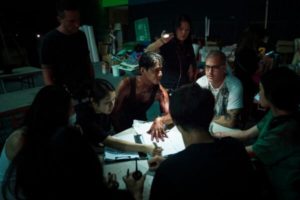
Rob Jabbaz: I think you might like it. I think it’s very beautiful. Actually, that’s what I think is its strength, it’s hypnotically beautiful but also scary. It’s much like The Sadness. I like movies that you watch with your heart and not so much with your cerebral mind. Trust me, I can write. I can do really heavy shit as far as sci-fi is concerned, but with something like The Sadness? Too much story in something like The Sadness isn’t practical.
PopHorror: I have one last question for you, Rob. What is your favorite scary movie?
Rob Jabbaz: Oh, Jesus Christ. I don’t know. To be honest, my favorite movies these days, the ones that are really impressing me, are not horror movies. I will give you a scary movie, but I’ll just tell you that, right before we started doing The Sadness, I had just seen Uncut Gems, and that just blew my mind. You know what else was good? Raw by Julia Ducournau. That’s the kind of movie that just makes me feel like ewww, this is out of control—the sex, the partying, the heavy drinking, the drugs, and all that shit. I don’t know if I’m ready for this movie. It’s too much for me or something. I love that.
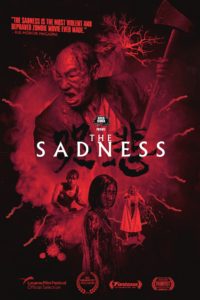
Thank you so much, Rob, for taking the time to speak with us. Be sure to catch The Sadness, which won Fantasia’s New Flesh Award for Best First Feature and Bronze for Best Asian Feature 2021, and is currently on the festival circuit.
 PopHorror Let's Get Scared
PopHorror Let's Get Scared
